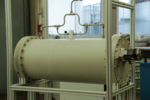Baden-Württemberg and its companies
Bioeconomy refers to the sustainable management of renewable natural resources, which is why there is no such thing as a bioeconomy industry in the traditional sense. However, there are companies in Baden-Württemberg that use biomass as raw material base and have already developed products and processes in their effort to act more sustainably
The energy producer badenova uses male corn plants to produce renewable natural gas (RNG). The company circumvents the food vs fuel conflict as the male plants are only used to pollinate female corn before being discarded. A company called TECNARO from Ilsfeld/Auenstein near Heilbronn has developed a technology that it uses to produce injection-mouldable plastics and fibrous materials from lignin. These materials are already being used in numerous products. The company fischerwerke has developed a wall plug that is partially produced from renewable resources. The wall plug is produced from two-component nylon, and one of the two components is produced from castor oil. Daimler AG's A-Class is equipped with an engine cover that is also produced with a plastic partially made from biological resources.
Companies not only face challenges relating to products, but also concerning innovative production processes. New methods and machines need to be developed in order to be able to use biomass sustainably on an industrial scale. This means that traditional sectors such as the mechanical engineering and plant construction sectors must be made aware and persuaded of the necessity and benefits of the bioeconomy.
Company profiles
-
Sustainable construction - 28/03/2023

A switch to sustainable and circular construction concepts is needed to significantly reduce greenhouse gas emissions in the construction sector. At the German National Garden Show (Bundesgartenschau) in Mannheim, FibR GmbH, together with researchers from the Karlsruhe Institute of Technology, will be showcasing two innovative buildings made from flax and willow, renewable raw materials that exemplify possible building concepts of the future.
-
Residual materials with potential - 16/03/2023

The objective of the PeePower™ BUGA 2023 collaborative research project is to produce green hydrogen and platform chemicals from wastewater. This fits in nicely with BUGA 2023’s (German National Garden Show) four major themes, namely, climate, energy, environment and food security.
Company foundations in the bioeconomy field
-
Sustainable construction - 28/03/2023

A switch to sustainable and circular construction concepts is needed to significantly reduce greenhouse gas emissions in the construction sector. At the German National Garden Show (Bundesgartenschau) in Mannheim, FibR GmbH, together with researchers from the Karlsruhe Institute of Technology, will be showcasing two innovative buildings made from flax and willow, renewable raw materials that exemplify possible building concepts of the future.
-
Residual materials with potential - 16/03/2023

The objective of the PeePower™ BUGA 2023 collaborative research project is to produce green hydrogen and platform chemicals from wastewater. This fits in nicely with BUGA 2023’s (German National Garden Show) four major themes, namely, climate, energy, environment and food security.
News of bioeconomic companies
-
Press release - 18/07/2023
As the world's population continues to grow, the construction industry faces the challenge of using fewer resources and switching to sustainable materials. Scientists from the Universities of Stuttgart and Freiburg are developing new interdisciplinary approaches to construction for the future.
-
Press release - 12/07/2023
Insightful study with participation from the University of Konstanz warns of human-induced impacts on the marine ecosystem.
Website address: https://www.biooekonomie-bw.de/en/bw/stakeholders/companies

